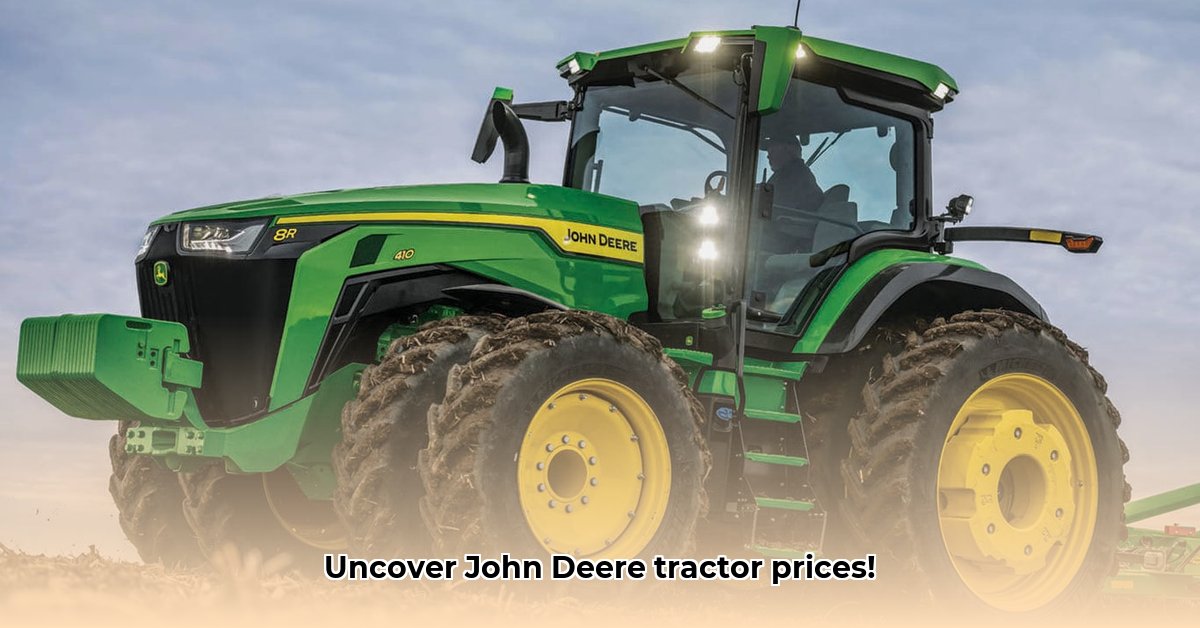
Thinking about purchasing a John Deere tractor? The cost varies significantly, depending on the model and features. This guide provides price ranges, key influencing factors, sustainability considerations, and actionable steps to help you make an informed decision. For added stability, consider tractor wheel weights.
John Deere Tractor Prices: A Class-Based Overview
The price of a John Deere tractor is highly dependent on its class and features. Here's a general price range for different tractor categories in USD. Remember, these are estimates, and actual prices vary based on the specific model, features, and dealer location.
| Tractor Category | Price Range (USD) |
|---|---|
| Compact (1-4 Series) | $20,000 - $60,000 |
| Utility (5-6 Series) | $60,000 - $150,000 |
| Specialty Tractors | $70,000 - $250,000+ |
| Row Crop Tractors | $150,000 - $300,000+ |
| 4-Wheel Drive (4WD) | $200,000 - $500,000+ |
Factors Affecting John Deere Tractor Prices
Several factors significantly impact the final cost of a John Deere tractor beyond the base model price.
Horsepower: Higher horsepower equates to greater power and capability, but also a higher price. A 100-horsepower tractor will cost considerably less than a 300-horsepower model.
Features: Advanced features like GPS-guided steering (precision agriculture) and automated implement controls increase efficiency but also add cost. These technologies, while increasing initial investment, can often lead to substantial long-term savings through reduced resource waste.
Attachments: Additional implements like loaders, backhoes, or specialized tools for specific farming tasks increase the overall cost. Carefully consider your essential attachments to avoid unnecessary expenditure.
Technological Advancements: Precision agriculture technologies, offering improved efficiency and reduced environmental impact, are becoming increasingly common and influence the overall price. These investments often pay off through optimized resource utilization.
Sustainability and Your Tractor Choice: More Than Just the Price Tag
While the initial purchase price is crucial, long-term operational costs and environmental impact should heavily influence your decision. Fuel efficiency – a key sustainability factor – is directly impacted by tractor size and technology. Smaller tractors often prove more fuel-efficient over their lifespan, despite potentially costing less initially.
Smaller tractors also minimize the need for broad-scale chemical applications, leading to reduced environmental impact and cost savings. Precision agriculture technologies, while increasing the initial investment cost, significantly reduce chemical and fertilizer use, improving both environmental sustainability and long-term profitability.
Isn't it important to consider the total cost of ownership, including fuel, maintenance, and environmental impact, rather than just the sticker price?
Selecting the Right John Deere Tractor: A Practical Guide
Choosing the right tractor involves a strategic approach. Here's a step-by-step guide:
Assess Your Farming Needs: Carefully evaluate your farm size, crops, and necessary tasks. This determines the required horsepower and features. Avoid overspending on unnecessary power.
Budgeting and Financing: Create a detailed budget, exploring financing options such as loans and leasing. Research government subsidies for sustainable agricultural practices and explore potential tax incentives and grants related to equipment upgrades.
Thorough Comparison: Research various John Deere models that align with your needs and budget. Compare features, warranties, and long-term operational costs before making a final decision. Consider test driving several models if possible to determine the ideal choice for your operation.
Making the Right Investment
The purchase of a John Deere tractor is a significant investment. Prioritize a balanced approach, weighing initial cost against long-term operational expenses and environmental considerations. Focusing on total cost of ownership over the tractor's lifespan, rather than simply the purchase price, will ensure a more sustainable and financially sound investment. Remember, responsible agricultural practices encompass both financial prudence and environmental stewardship.